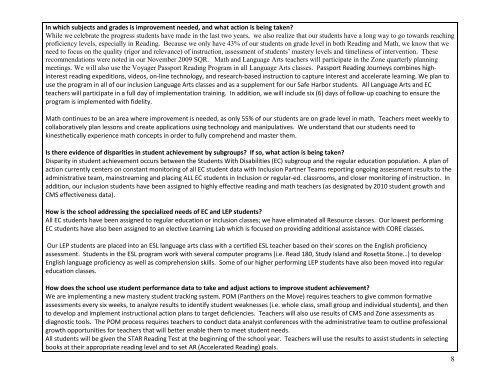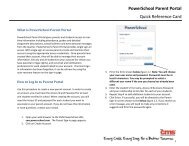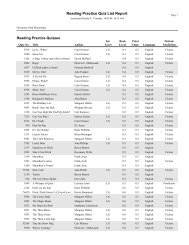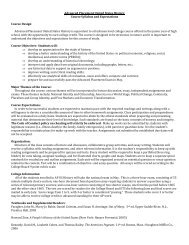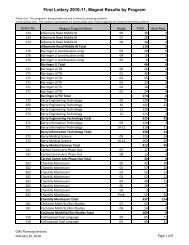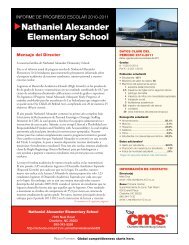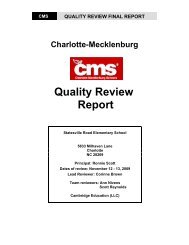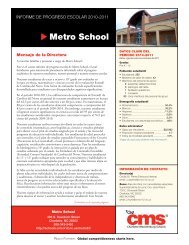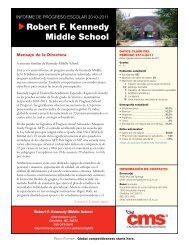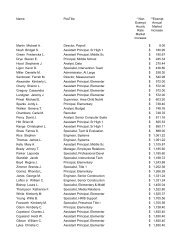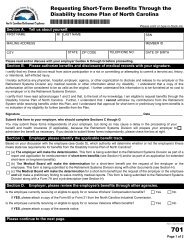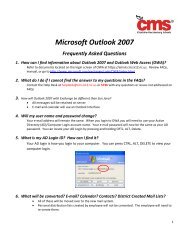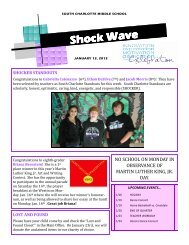SIP JT Williams MS 2010-11 - Charlotte-Mecklenburg Schools
SIP JT Williams MS 2010-11 - Charlotte-Mecklenburg Schools
SIP JT Williams MS 2010-11 - Charlotte-Mecklenburg Schools
Create successful ePaper yourself
Turn your PDF publications into a flip-book with our unique Google optimized e-Paper software.
In which subjects and grades is improvement needed, and what action is being taken?<br />
While we celebrate the progress students have made in the last two years, we also realize that our students have a long way to go towards reaching<br />
proficiency levels, especially in Reading. Because we only have 43% of our students on grade level in both Reading and Math, we know that we<br />
need to focus on the quality (rigor and relevance) of instruction, assessment of students’ mastery levels and timeliness of intervention. These<br />
recommendations were noted in our November 2009 SQR. Math and Language Arts teachers will participate in the Zone quarterly planning<br />
meetings. We will also use the Voyager Passport Reading Program in all Language Arts classes. Passport Reading Journeys combines highinterest<br />
reading expeditions, videos, on-line technology, and research-based instruction to capture interest and accelerate learning. We plan to<br />
use the program in all of our inclusion Language Arts classes and as a supplement for our Safe Harbor students. All Language Arts and EC<br />
teachers will participate in a full day of implementation training. In addition, we will include six (6) days of follow-up coaching to ensure the<br />
program is implemented with fidelity.<br />
Math continues to be an area where improvement is needed, as only 55% of our students are on grade level in math. Teachers meet weekly to<br />
collaboratively plan lessons and create applications using technology and manipulatives. We understand that our students need to<br />
kinesthetically experience math concepts in order to fully comprehend and master them.<br />
Is there evidence of disparities in student achievement by subgroups? If so, what action is being taken?<br />
Disparity in student achievement occurs between the Students With Disabilities (EC) subgroup and the regular education population. A plan of<br />
action currently centers on constant monitoring of all EC student data with Inclusion Partner Teams reporting ongoing assessment results to the<br />
administrative team, mainstreaming and placing ALL EC students in Inclusion or regular-ed. classrooms, and closer monitoring of instruction. In<br />
addition, our inclusion students have been assigned to highly effective reading and math teachers (as designated by <strong>2010</strong> student growth and<br />
C<strong>MS</strong> effectiveness data).<br />
How is the school addressing the specialized needs of EC and LEP students?<br />
All EC students have been assigned to regular education or inclusion classes; we have eliminated all Resource classes. Our lowest performing<br />
EC students have also been assigned to an elective Learning Lab which is focused on providing additional assistance with CORE classes.<br />
Our LEP students are placed into an ESL language arts class with a certified ESL teacher based on their scores on the English proficiency<br />
assessment. Students in the ESL program work with several computer programs (i.e. Read 180, Study Island and Rosetta Stone…) to develop<br />
English language proficiency as well as comprehension skills. Some of our higher performing LEP students have also been moved into regular<br />
education classes.<br />
How does the school use student performance data to take and adjust actions to improve student achievement?<br />
We are implementing a new mastery student tracking system. POM (Panthers on the Move) requires teachers to give common formative<br />
assessments every six weeks, to analyze results to identify student weaknesses (i.e. whole class, small group and individual students), and then<br />
to develop and implement instructional action plans to target deficiencies. Teachers will also use results of C<strong>MS</strong> and Zone assessments as<br />
diagnostic tools. The POM process requires teachers to conduct data analyst conferences with the administrative team to outline professional<br />
growth opportunities for teachers that will better enable them to meet student needs.<br />
All students will be given the STAR Reading Test at the beginning of the school year. Teachers will use the results to assist students in selecting<br />
books at their appropriate reading level and to set AR (Accelerated Reading) goals.<br />
8


